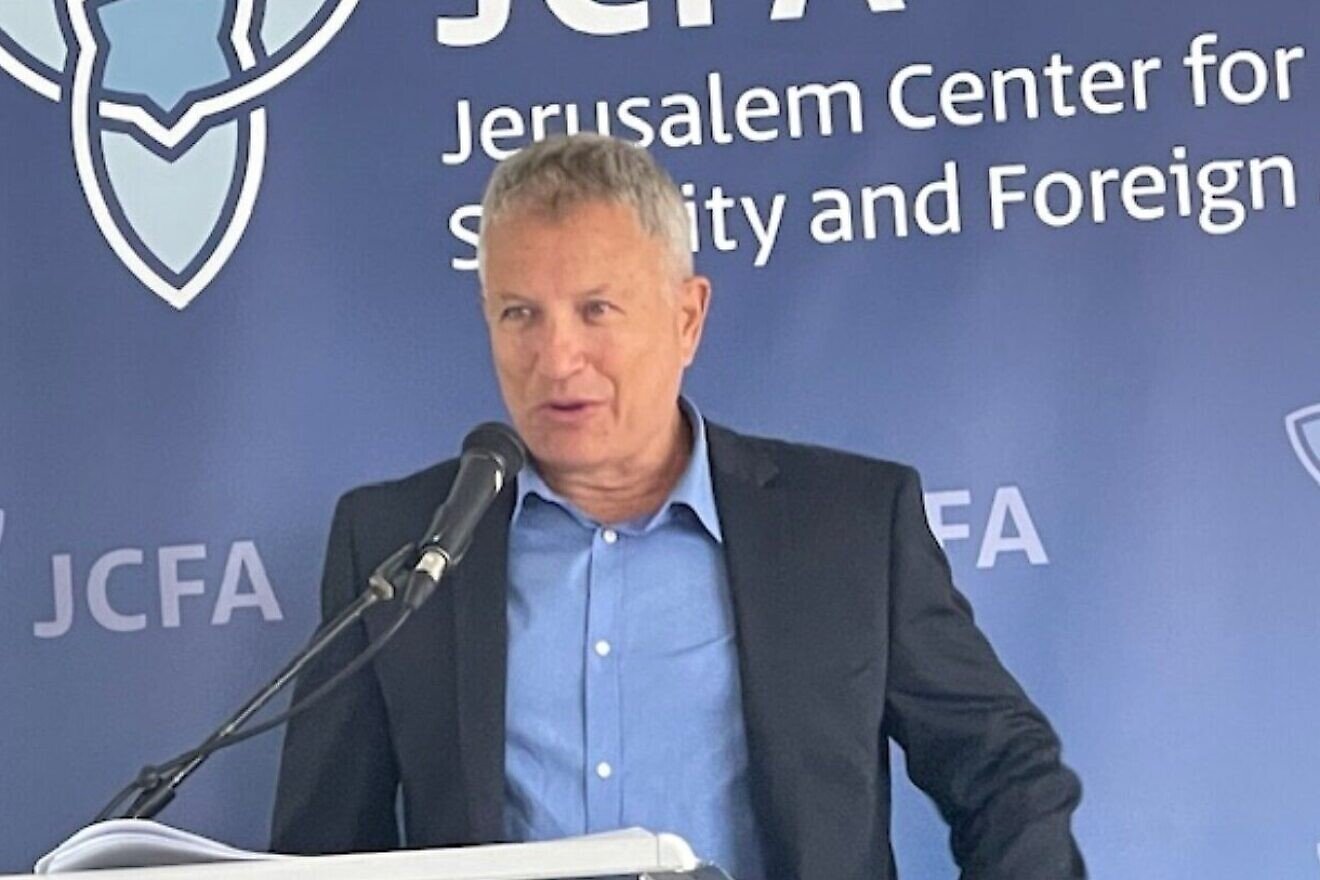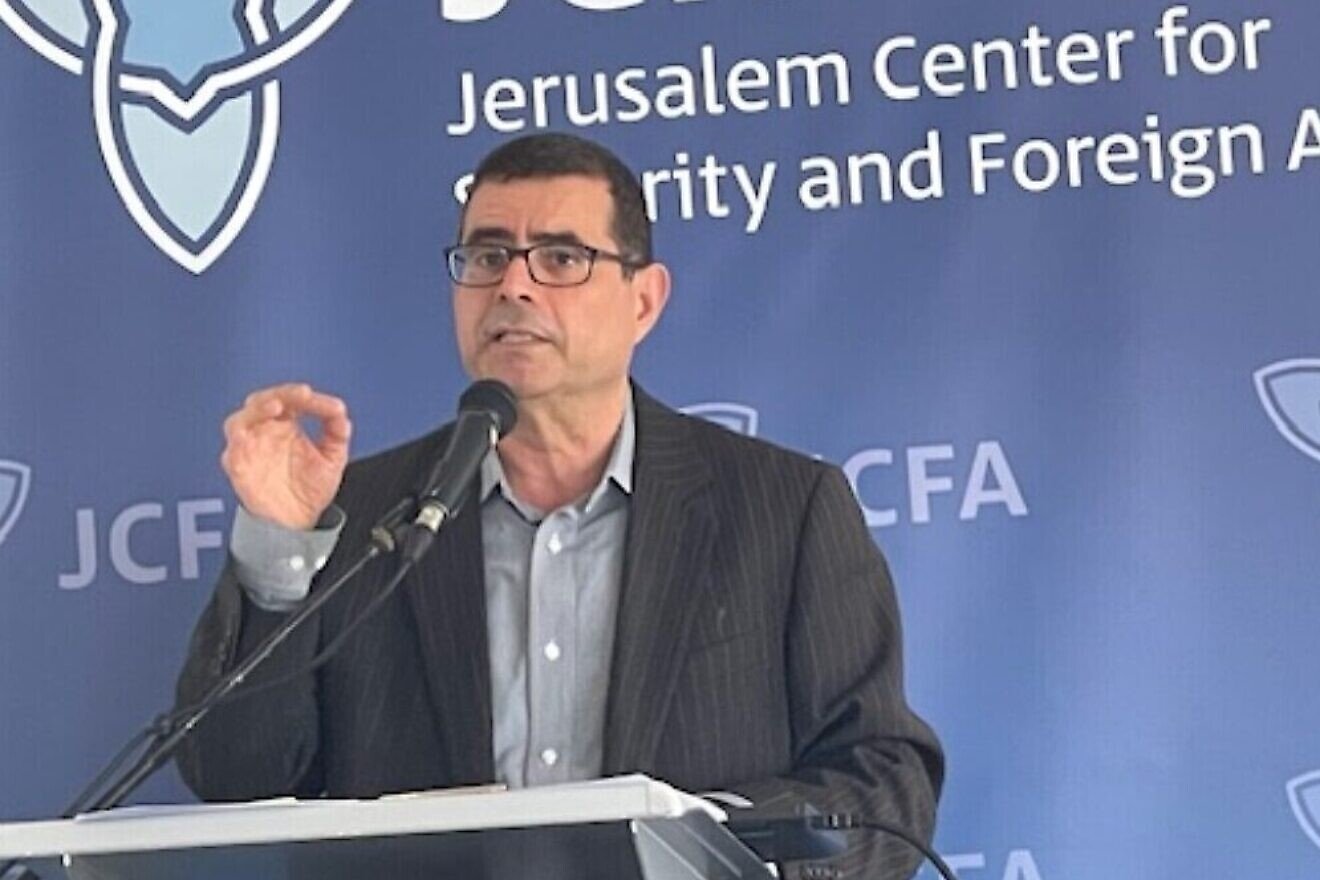(JNS) Diplomats and foreign media gathered in Tel Aviv on Wednesday for a conference hosted by the Jerusalem Center for Security and Foreign Affairs (JCFA) to discuss the “day after” in Gaza.
The half-day conference, titled, “How Should Israel and the US Now Navigate the Dangers and Opportunities of President Trump’s 20-Point Plan,” examined the opportunities, but mainly the pitfalls, of President Donald Trump’s plan, unveiled at the White House on Sept. 29.
The plan outlined a comprehensive ceasefire, reconstruction and governance framework aimed at ending the Gaza conflict and rebuilding the Gaza Strip.
The first phase, involving the return of the remaining hostages being held in Gaza, has been carried out successfully, barring the return of a number of bodies. Conference participants, however, expressed profound skepticism about the second phase, which would involve the complete dismantlement and disarmament of Hamas.
“Unfortunately, I don’t think that Hamas will volunteer to put aside its weapons,” said the conference’s keynote speaker, Knesset member Avi Dichter, currently Israel’s minister of agriculture and rural development, who sits on the Security Cabinet. He said the odds were about as high as those of Israel winning the World Cup.
Dichter, who has served as minister of internal security (2006-2009) and director of the Israel Security Agency, or Shin Bet (2000-2005), Israel’s equivalent to the FBI, also said that Hamas’s game of slow-walking the return of the remaining hostages’ bodies is to play for time so it can reassert control over the Gaza Strip.
The ruse won’t work, he said. Until Hamas disarms, Israel won’t retreat further from the “yellow line,” the temporary demarcation line in Gaza to which Israeli forces withdrew as part of the first phase of the ceasefire. Israel still maintains control of more than 50% of the Strip.
Dichter injected a note of realism into other aspects of the plan, pouring cold water over “Point 9,” which suggests that the Palestinian Authority, which currently controls parts of Judea and Samaria, will be granted power over the Gaza Strip.
“Some people think that Israel will allow the PA to come back to the Gaza Strip… We’re not going to do it,” he said, noting that the PA couldn’t manage the Gaza Strip when it was much stronger in 2007, the year it was ousted by Hamas.
Turkey, which has been positioning itself to play a key role in post-war Gaza, also will not be allowed to gain a foothold in the Strip, he said. Under President Recep Tayyip Erdoğan, Turkey has become hostile to Israel, openly supporting Hamas. “President Trump said [of Erdoğan], ‘He’s my friend.’ But he’s not [Israeli Prime Minister Benjamin] Netanyahu’s friend,” said Dichter.
Regarding the Trump plan’s “Point 10,” which describes an “economic development plan to rebuild and energize Gaza,” Dichter said that Gaza’s reconstruction will not mean a “Singapore of the Middle East.” He noted that 25% of Gazans still live in refugee camps.
On the broader strategic picture, Dichter expressed far more optimism. Iran’s dreams of regional domination have been significantly set back and it will take billions of dollars for it to rebuild what Israel destroyed during the June war, he said.
Iran also lost its northern and southern axes in the region, he said.
The northern axis stretched from Iran across Iraq, into Syria and Lebanon. Israel sent Lebanon-based Hezbollah reeling and a knock-on effect was the destruction of the Alawite regime in Syria, which has ruled Syria since 1963, yet “disappeared within 10 days,” he said.
The southern axis extended from Iran to Yemen and north to the Gaza Strip, where Iran helped build two terror armies: Hamas with some 30,000 fighters and Palestinian Islamic Jihad with 10,000. Hamas and PIJ are virtually no more. Yemen’s Houthis are still a problem, he acknowledged. They continue to block maritime traffic to the Red Sea and Suez Canal and have shut down Israel’s southern port of Eilat. “We cannot live with it,” he said, stressing that Israel will deal with the issue.
Oded Ailam, former head of the Mossad’s Counterterrorism Division and a JCFA researcher, touched on some of the same points.
Ailam rejected as unworkable an idea floated by the US administration that Hamas be allowed to retain its light arms for “personal protection.”
“If Hamas and the [Palestinian] Islamic Jihad maintain weapons in the area, there is no chance any entity in Gaza will take the place of Hamas,” he said.
He also said no outside force will take on the task of disarming Hamas.

Oded Ailam, former head of the Mossad’s Counterterrorism Division and a JCFA researcher, speaks at the JCFA conference in Tel Aviv, Nov. 5, 2025. Photo by David Isaac.
Ailam expressed skepticism regarding the Trump plan as a whole. “It’s not an agreement,” he said, “it’s a letter of intent. The first letter of intent was initiated very successfully. We got our live hostages back. The second one, I don’t see how it’s going to happen.”
The fact that the US administration is pushing for Turkey and Qatar to be involved in Gaza’s future is “a big problem,” according to Ailam.
The two pro-Muslim Brotherhood countries are maneuvering to preserve Hamas’s influence under the guise of compliance with the ceasefire terms. They’re offering Hamas a kind of “plea bargain,” he said, promising protection and support if Hamas pretends that it’s meeting the conditions of the deal.
If Hamas survives and retains power despite the blows delivered by Israel, jihadist forces would be emboldened worldwide, he added.
Asked by JNS if it was possible that a governing body not aligned with Muslim Brotherhood ideology could exist in Gaza given the hostility of the population to Israel, Ailam said it would take a long time to reach that point, as the Gazan population has been marinated in jihadist ideology.
“Take into consideration that 65% of the Gazan people are under 18, which means all of them were born under the Hamas regime,” he said. “They’ve been taught in schools run by the United Nations Relief and Works Agency [UNRWA]. UNRWA texts have been shown to consistently extol violence and teach overt antisemitism.”
Expanding on the larger aims of Hamas, IDF Lt.-Col. (ret.) Jonathan D. Halevi, a JCFA senior researcher on the Middle East and radical Islam, said that the goal of the Oct. 7, 2023, Hamas attack on southern Israel went beyond “a massacre for the sake of massacre.”
The goal of the Oct. 7 attack was to entirely annihilate Israel, leading in the minds of its architects to a series of events that would topple pro-Western Arab regimes in the region, he said. Hezbollah and Iran had agreed to the plan, which was to involve militias in Yemen, Syria, Arabs in Judea and Samaria and Arabs within Israel, something they believed was feasible after the rioting in mixed Arab-Jewish cities during the 2021 Gaza-Israel conflict.

IDF Lt.-Col. (ret.) Jonathan D. Halevi, a JCFA senior researcher on the Middle East and radical Islam, speaks at the JCFA conference in Tel Aviv, Nov. 5, 2025. Photo by David Isaac.
Halevi attempted to answer the question of why Hamas leader Yahya Sinwar struck before informing Hezbollah. Halevi’s research convinced him that the reason lies in the Sunni-Shi’ite divide.
He explained that the anti-Israel axis was predominantly Shi’ite, including foremost, Iran, then Hezbollah and the smaller militias in Syria, Iraq and Yemen. Hamas was the only Sunni component within this otherwise Shi’ite alliance, he noted.
Sinwar feared that letting the Shi’ite members lead would lead to a Shi’ite “occupation” of Palestine, he said.
Currently, the focus of JCFA’s efforts is to raise awareness of the global Islamist threat. The only Israeli think tank with a US branch, it educates Americans about the danger posed by Islamic extremism, and primarily by the Muslim Brotherhood.
The Brotherhood, founded in Egypt in 1928, seeks to establish a global caliphate. Some Brotherhood offshoots are openly violent, such as Hamas, but those in the West pursue their aims through political and social means, operating within the democratic system.
The JCFA identifies the Council on American–Islamic Relations (CAIR) and the Islamic Society of North America (ISNA) as examples of Muslim Brotherhood advocacy groups operating in the United States.
Sagiv Steinberg, CEO at JCFA, told JNS that many in the West, including in the United States, fail to grasp Islamist intentions, which are openly expressed in Arabic but not in English. JCFA works with Arab scholars to explain to Western governments what the region’s actors truly want.
Steinberg warned that Western values of liberty, equality and free speech are under threat, and that the Western states risk a fate no different than that of Syria if they continue to tolerate the activities of Muslim Brotherhood groups.
For some European countries, it’s already too late, he said, while others are on the verge of “collapsing.”
The results of Tuesday’s New York City mayoral election show that America also is at risk, according to Steinberg. He expressed fear that Zohran Mamdami’s victory would have a “domino effect,” and lead to a string of wins by anti-Western Muslim candidates. Such an outcome could have ramifications for the entire free world, he said.
Want more news from Israel?
Click Here to sign up for our FREE daily email updates














